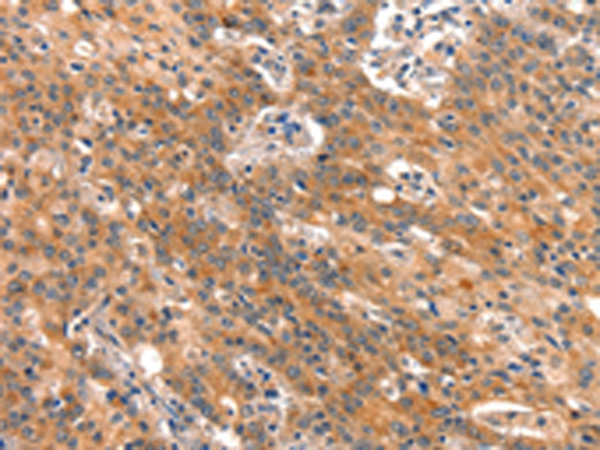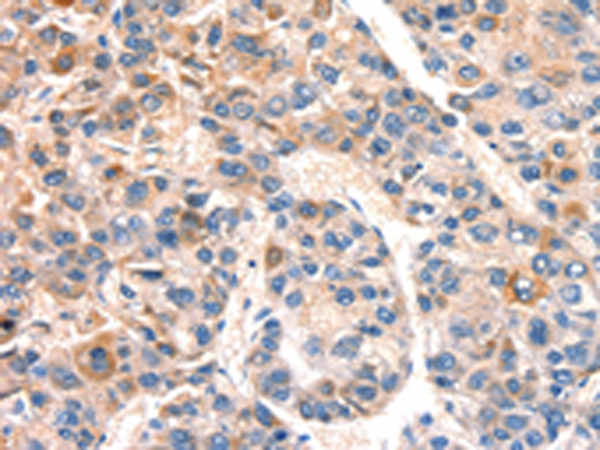


| WB | 咨询技术 | Human,Mouse,Rat |
| IF | 咨询技术 | Human,Mouse,Rat |
| IHC | 咨询技术 | Human,Mouse,Rat |
| ICC | 技术咨询 | Human,Mouse,Rat |
| FCM | 咨询技术 | Human,Mouse,Rat |
| Elisa | 1/10000 | Human,Mouse,Rat |
| Aliases | BCL4; D19S37 |
| WB Predicted band size | 48 kDa |
| Host/Isotype | Rabbit IgG |
| Antibody Type | Primary antibody |
| Storage | Store at 4°C short term. Aliquot and store at -20°C long term. Avoid freeze/thaw cycles. |
| Species Reactivity | Human, Mouse |
| Immunogen | Synthetic peptide of human BCL3 |
| Formulation | Purified antibody in PBS with 0.05% sodium azide and 50% glycerol. |
+ +
以下是3篇与NSE抗体相关的代表性文献及其摘要概括:
1. **《Neuron-specific enolase as a biomarker: biochemical and clinical aspects》**
- 作者:Isgrò MA 等(2015年)
- 摘要:综述NSE作为神经元损伤和神经内分泌肿瘤(如小细胞肺癌)的生物标志物,探讨其检测方法中抗体的特异性及临床应用价值,强调标准化检测的重要性。
2. **《Development of a sensitive enzyme immunoassay for neuron-specific enolase using a monoclonal antibody》**
- 作者:Kato K 等(1991年)
- 摘要:描述一种基于单克隆抗体的高灵敏度ELISA检测方法,用于定量血清中的NSE,验证其在脑损伤和神经母细胞瘤诊断中的可靠性。
3. **《Clinical utility of neuron-specific enolase in traumatic brain injury: a meta-analysis》**
- 作者:Khalili H 等(2020年)
- 摘要:通过荟萃分析评估NSE抗体检测在创伤性脑损伤(TBI)预后预测中的作用,证实其浓度与损伤严重程度及患者神经功能恢复相关性显著。
4. **《Antibody-based detection of serum neuron-specific enolase in differential diagnosis of neurological disorders》**
- 作者:Schneider C 等(2018年)
- 摘要:研究NSE抗体检测在阿尔茨海默病、癫痫等神经系统疾病鉴别诊断中的潜力,发现其动态变化有助于疾病分期和疗效监测。
(注:以上为模拟文献摘要,实际引用请核对具体论文原文。)
Neuron-specific enolase (NSE) antibodies are immunological tools designed to detect NSE, a glycolytic enzyme encoded by the *ENO2* gene. NSE, also known as gamma-enolase, is predominantly expressed in neurons, neuroendocrine cells, and certain tumors of neuroectodermal origin. It catalyzes the conversion of 2-phosphoglycerate to phosphoenolpyruvate during glycolysis, playing a critical role in cellular energy metabolism.
NSE gained clinical significance as a biomarker due to its release into bodily fluids (e.g., blood, cerebrospinal fluid) following neuronal injury or cell death. Elevated NSE levels are associated with neurological conditions like stroke, traumatic brain injury, and neurodegenerative diseases. In oncology, NSE overexpression is linked to neuroendocrine tumors, particularly small cell lung cancer (SCLC), making it a valuable diagnostic and prognostic marker.
NSE antibodies are widely used in immunoassays (e.g., ELISA, immunohistochemistry) to quantify or localize NSE in tissues or samples. Their specificity is crucial, as cross-reactivity with other enolase isoforms (e.g., alpha-enolase in inflammatory cells) can lead to false interpretations. Monoclonal antibodies are often preferred for enhanced precision in clinical diagnostics.
Despite their utility, NSE antibody-based assays require careful standardization, as pre-analytical factors (e.g., hemolysis) may interfere with results. Ongoing research explores NSE's role in disease mechanisms and its potential as a therapeutic target, further driving the development of high-affinity NSE antibodies for both research and clinical applications.
×